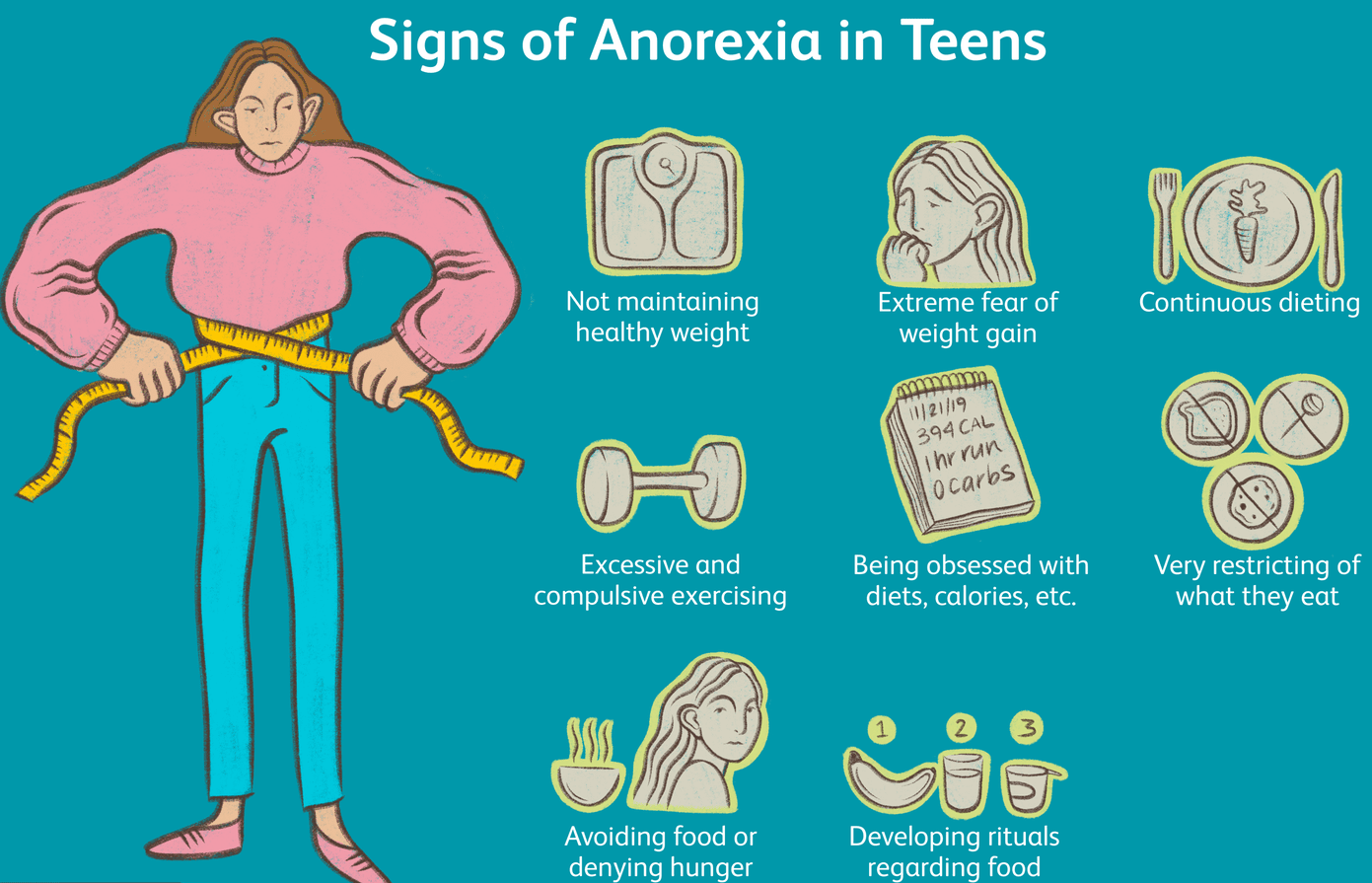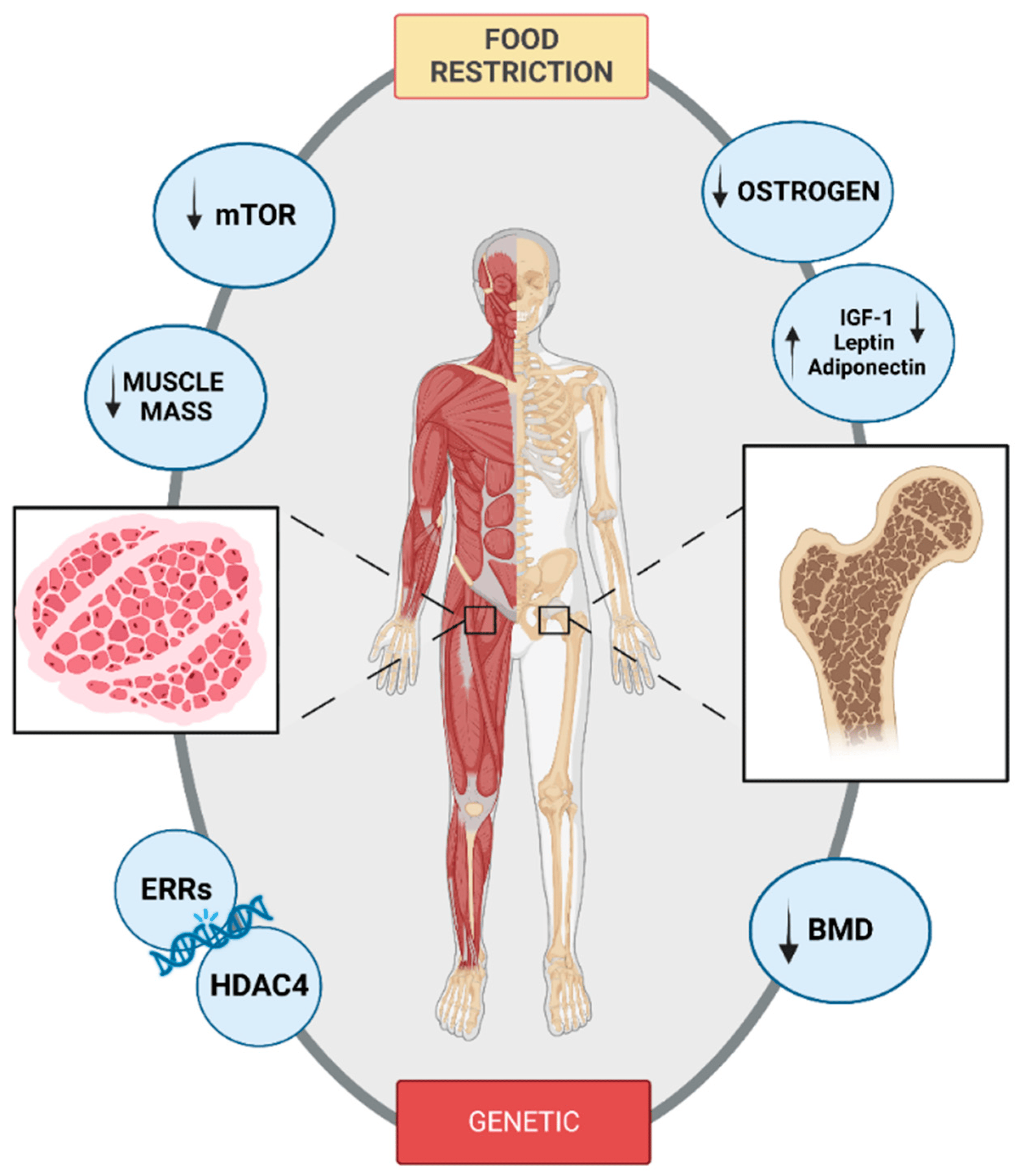Anorexia nervosa is a serious eating disorder characterized by an intense fear of gaining weight or becoming fat, leading to a dangerously low body weight. A person with anorexia nervosa often has a distorted body image and may engage in extreme dieting, excessive exercise, or purging behaviors to control their weight.
The condition can have severe physical and psychological consequences, including malnutrition, organ damage, and an increased risk of suicide. Anorexia nervosa is a complex disorder that requires specialized treatment. Follow us here at Mi vs. Redmi
Criteria
According to the Diagnostic and Statistical Manual of Mental Disorders (DSM-5), the criteria for anorexia nervosa include:
1. Restriction of energy intake relative to requirements, leading to a significantly low body weight in the context of age, sex, developmental trajectory, and physical health. This means that the individual's weight is significantly below what is considered healthy for their age, sex, and height.
2. Intense fear of gaining weight or becoming fat, or persistent behavior that interferes with weight gain, even though at a significantly low weight. This fear is often irrational and disproportionate to the individual's actual weight.
3. Disturbance in the way one's body shape or weight is experienced, undue influence of body shape or weight on self-evaluation, or persistent lack of recognition of the seriousness of the current low body weight. This indicates a distorted body image and an unhealthy obsession with weight and appearance
Specifiers and Subtypes
The DSM-5 recognizes two subtypes of anorexia nervosa based on the primary method used to restrict calorie intake:
1. Restricting Type
Individuals with the restricting type of anorexia nervosa primarily lose weight through dieting, fasting, or excessive exercise. They do not regularly engage in binge eating or purging behaviors.
2. Binge-Eating/Purging Type
Individuals with this subtype engage in both binge eating and compensatory behaviors, such as self-induced vomiting, excessive exercise, or misuse of laxatives or diuretics.
Additional Specifiers
- In partial remission: When criteria for anorexia nervosa have been met in the past but are not currently met, and low body weight has not been met for a sustained period, but at least one of the other two criteria for anorexia nervosa is still met.
- In full remission: When criteria for anorexia nervosa have been met in the past but are not currently met, and none of the criteria have been met for at least 12 months.
Signs and Symptoms

Anorexia nervosa is a serious eating disorder characterized by a relentless pursuit of thinness and a distorted body image.
Physical Symptoms
- Extreme weight loss: Significantly below a healthy weight for age, height, and body type.
- Amenorrhea: Loss of menstrual periods in females.
- Lanugo: Fine, downy hair that grows on the body.
- Cold intolerance: Difficulty tolerating cold temperatures.
- Dry skin and brittle nails.
- Fatigue and weakness.
- Constipation or diarrhea.
- Heart problems: Irregular heartbeat, low blood pressure, and heart failure.
Psychological Symptoms
- Distorted body image: Seeing oneself as overweight or obese, even when extremely underweight.
- Intense fear of gaining weight.
- Preoccupation with food, calories, and weight.
- Compensatory behaviors: Purging (self-induced vomiting or misuse of laxatives), excessive exercise, or fasting.
- Social withdrawal: Avoiding social situations involving food.
- Depression, anxiety, and irritability.
- Obsessive-compulsive thoughts and behaviors.
It's important to note that these symptoms can vary in severity and may not be present in all individuals with anorexia nervosa.
Negative Impacts of Anorexia Nervosa on Life
Anorexia nervosa can have severe and far-reaching consequences, affecting various aspects of a person's life:
Physical Health Consequences
- Malnutrition: Significant weight loss and nutrient deficiencies can lead to organ damage, including heart problems, kidney failure, and bone density loss.
- Electrolyte imbalances: Can cause irregular heart rhythms, seizures, and even death.
- Gastrointestinal problems: Constipation, diarrhea, and gastroparesis (delayed gastric emptying).
- Hormonal imbalances: Amenorrhea (loss of menstrual periods) in females and decreased testosterone levels in males.
- Osteoporosis: Weakening of bones due to lack of calcium and other nutrients.
Psychological Consequences
- Depression and anxiety: Common comorbidities that can worsen the course of anorexia nervosa.
- Low self-esteem: Negative body image and feelings of inadequacy.
- Obsessive-compulsive thoughts: Preoccupation with food, weight, and body shape.
- Social isolation: Difficulty maintaining relationships due to preoccupation with food and body image.
- Increased risk of suicide: Individuals with anorexia nervosa are at a higher risk of suicidal ideation and attempts.
Social and Occupational Consequences
- Impaired social functioning: Difficulty participating in social activities or maintaining relationships.
- Academic or occupational difficulties: Decreased concentration, motivation, and performance.
- Financial difficulties: Spending on food, diet products, or medical expenses.
Associative Features
Associative features of anorexia nervosa are additional characteristics often seen in individuals with this condition. These features can vary in severity and impact but can contribute to the overall clinical picture.
Common Associative Features
- Obsessive-compulsive disorder (OCD): Rigid rules and rituals related to food, exercise, or body image.
- Depression and anxiety: These mood disorders often co-occur with anorexia nervosa.
- Social withdrawal: Difficulty maintaining relationships due to preoccupation with food, weight, and body image.
- Perfectionism: Unrealistic standards of excellence and a need for control.
- Body dysmorphic disorder: Preoccupation with perceived flaws in physical appearance.
- Substance abuse: Use of alcohol or drugs as a coping mechanism.
- Self-harm: Cutting, burning, or other forms of self-injury.
Prevalence and Demographics
Prevalence
- Anorexia nervosa is a relatively rare eating disorder compared to others like bulimia nervosa or binge eating disorder.
- Exact prevalence rates vary across studies and populations, but it is estimated to affect approximately 0.5% to 1% of females and 0.1% to 0.3% of males.
Demographics
- Gender: While anorexia nervosa is more prevalent in females, it also affects males.
- Socioeconomic status: This can occur in individuals from all socioeconomic backgrounds.
- Cultural factors: The prevalence and expression of anorexia nervosa can vary across cultures.
- Genetic factors: A family history of eating disorders or other mental health conditions can increase the risk.
Development and Course
Development
- Early onset: Anorexia nervosa typically begins in adolescence or young adulthood, often during times of transition or stress.
- Influencing factors: A combination of genetic, psychological, and environmental factors likely contributes to the development of anorexia nervosa. These factors may include family history, societal pressures, and personal experiences.
Course
- Fluctuating severity: Symptoms may vary in intensity over time, with periods of remission and relapse.
- Long-term consequences: If left untreated, anorexia nervosa can have serious health consequences, including increased risk of osteoporosis, heart problems, and death.
Risks and Prognostic Factors
Risks/Causes
Several factors can increase the risk of developing anorexia nervosa:
- Genetic predisposition: A family history of eating disorders or other mental health conditions.
- Psychological factors: Low self-esteem, perfectionism, body dissatisfaction, and difficulty regulating emotions.
- Environmental factors: Societal pressure to be thin, dieting trends, and exposure to unrealistic body images.
- Other mental health conditions: Comorbid disorders such as depression, anxiety, or obsessive-compulsive disorder.
Prognostic Factors
Factors that can influence the course and outcome of anorexia nervosa include:
- Age of onset: A later onset may be associated with a better prognosis.
- Duration of illness: A shorter duration of symptoms is often associated with better outcomes.
- Severity of symptoms: The degree of weight loss and the presence of complications can impact prognosis.
- Comorbid conditions: The presence of other mental health disorders can complicate treatment and recovery.
- Treatment adherence: Consistent engagement in treatment is crucial for positive outcomes.
- Social support: A strong support system can facilitate recovery.
Culture-Related Diagnostic Issues
- Cultural ideals of beauty: Societal pressures to conform to unrealistic body standards can contribute to the development and maintenance of anorexia nervosa.
- Stigma: Cultural stigma associated with eating disorders can prevent individuals from seeking help and treatment.
- Food-related cultural practices: Certain cultural practices or dietary restrictions might be misinterpreted as anorexia nervosa.
Diagnostic Markers
Diagnostic markers for anorexia nervosa focus on the core features of the disorder:
- Intense fear of gaining weight or becoming fat.
- Distorted body image.
- Amenorrhea (loss of menstrual periods) in females.
- Other physical signs are dry skin, brittle hair, lanugo (fine hair), and cold intolerance.
- Psychological symptoms: Depression, anxiety, obsessive-compulsive behaviors.
Suicide Risk
Individuals with anorexia nervosa are at an *elevated risk of suicide*. Several factors contribute to this increased risk:
- Depression: Anorexia nervosa is often accompanied by depression, which is a major risk factor for suicide.
- Hopelessness: A distorted body image and fear of weight gain can lead to feelings of hopelessness and despair.
- Impulsivity: Some individuals with anorexia nervosa may engage in impulsive behaviors, including self-harm and suicide attempts.
- Reduced judgment: Malnutrition and electrolyte imbalances can impair cognitive functioning and judgment.
Functional Consequences
Anorexia nervosa can have severe and far-reaching consequences, affecting various aspects of a person's life:
- Physical health: Malnutrition, organ damage, electrolyte imbalances, and increased risk of death.
- Psychological health: Depression, anxiety, low self-esteem, and obsessive-compulsive thoughts.
- Social functioning: Isolation, strained relationships, and difficulty participating in social activities.
- Occupational or academic difficulties: Impaired concentration, reduced productivity, and difficulty completing tasks.
- Financial difficulties: Spending on food, diet products, or medical expenses.
Differential Diagnosis
Differential diagnosis involves distinguishing anorexia nervosa from other conditions that may present with similar symptoms. It's crucial for accurate diagnosis and appropriate treatment.
Conditions to consider
- Bulimia nervosa: Differentiated by the presence of binge eating and compensatory behaviors.
- Avoidant/restrictive food intake disorder: Characterized by persistent failure to meet appropriate nutritional needs without a distorted body image or fear of weight gain.
- Binge eating disorder: Involves recurrent episodes of binge eating without compensatory behaviors.
- Major depressive disorder: This can include decreased appetite and weight loss.
- Anxiety disorders: Generalized anxiety disorder, obsessive-compulsive disorder, and social anxiety disorder can sometimes present with eating restrictions.
- Medical conditions: Certain conditions (e.g., gastrointestinal disorders, endocrine disorders) can cause weight loss or appetite changes.
Comorbidity
Anorexia nervosa often co-occurs with other mental health conditions, which can complicate treatment and recovery. Common comorbidities include:
- Mood disorders: Depression, bipolar disorder
- Anxiety disorders: Generalized anxiety disorder, panic disorder, obsessive-compulsive disorder
- Substance abuse: Alcohol or drug use
- Personality disorders: Borderline personality disorder
- Obsessive-compulsive disorder: Rigid rules and rituals related to food and weight.
Treatment and Management
Treatment for anorexia nervosa typically involves a multidisciplinary approach, including medical, nutritional, and psychological interventions.
Medical Management
- Nutritional rehabilitation: Gradual restoration of healthy eating habits and weight gain under medical supervision.
- Hospitalization: In severe cases, hospitalization may be necessary to address malnutrition, electrolyte imbalances, and other medical complications.
- Medication: Antidepressants or antipsychotic medications may be used to treat co-occurring conditions like depression or anxiety.
Psychotherapy
- Cognitive-behavioral therapy (CBT): Helps individuals identify and challenge negative thoughts and behaviors related to body image and eating.
- Family-based therapy (FBT): Involves family members in the treatment process to support the individual's recovery.
- Interpersonal therapy (IPT): Focuses on improving interpersonal relationships and addressing emotional issues.
Self-Help and Support
While professional treatment is crucial, individuals with anorexia nervosa and their families can also benefit from:
- Support groups: Connecting with others who have similar experiences can provide support and understanding.
- Mindfulness and relaxation techniques: Can help manage stress and anxiety.
- Healthy lifestyle changes: Incorporating regular exercise, adequate sleep, and stress management techniques.